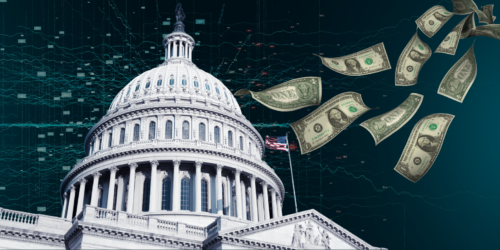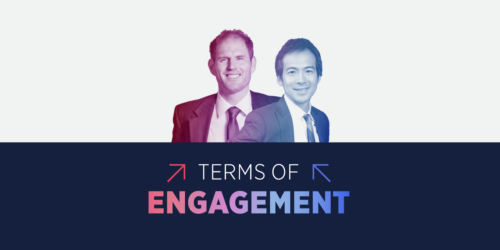What are those federal datasets and what do they have to do with me?
What data does the federal government have about me?
The federal government maintains comprehensive records of Americans’ interactions with government services. Government records include not only basic information like your name, address, birthday, and Social Security number, but a much broader range of data. Any time you submit a government form, file an application or your taxes with the government, register a complaint, or receive a service, these interactions become data in a government database. For example, the government maintains detailed records of:
- Financial information: Your tax returns, federal benefits, and any government payments.
- Health information: Your Medicare, Medicaid, or Veterans Administration (VA) records.
- Social Services and Public Benefits information: Information regarding any social services you may have applied for, including food assistance (WIC, SNAP), social security and disability income, and housing assistance
- Education information: Your educational history in federal student aid records and any government-funded research.
- Immigration information: Any visa or immigration benefits for which you applied, or information on applications for individuals you have sponsored.
You may have other sensitive data stored by the government as well. For example, if you’ve ever held a security clearance or government job, there are extensive background check records, including what your former colleagues and neighbors said about you. If you’ve ever served in the armed forces, your service records, including your mental health records, are held by the federal government. Data like employment records, fingerprints and facial recognition data, immigration status may also be included. Some private records (for example, private health data) may have been accessed by the government if needed for national security or law enforcement purposes.
What does the government normally use this data for?
The data maintained by the federal government is essential to running the government and providing public services. For example, tax records enable fair collection of revenue and distribution of benefits; healthcare data allow the United States Department of Veterans Affairs, Medicare, and Medicaid to provide care and track outcomes; and education records allow the government to manage student aid and measure program effectiveness. Every function of the federal government, from law enforcement to border protection to managing the economy, depends on robust, accurate data.
Because this data is so valuable and sensitive, the federal government has guardrails in place to ensure it is used appropriately. By law, federal agencies are required to:
- Use the data only for authorized purposes
- Protect it from unauthorized access
- Maintain accurate records of who accesses which data
- Keep data separated between agencies, unless those agencies are specifically authorized to share
Who normally has access to this data? What qualifications and safeguards are there?
Access to government data is traditionally strictly controlled through multiple layers of protection. Historically, all federal employees have been required to undergo some form of background check to ensure they are reliable, trustworthy, and suitable for the job, and they must obtain appropriate “clearances” before accessing sensitive data. Higher-level clearances and access to more sensitive data and information require more extensive and rigorous background checks that examine criminal records, financial history, foreign contacts, and other potential security risks, among other things.
In addition to security clearances, access to government data follows “need-to-know” principles. Even employees with security clearances can only access data necessary for their specific roles. Systems maintain detailed logs of who accesses what information and when, and regular audits ensure compliance with these restrictions. Most importantly, access to data is subject to strict privacy protections.
What is DOGE doing with my data?
What is DOGE?
The Department of Government Efficiency (DOGE), formerly the United States Digital Service (USDS), was established by executive order in 2025 under Elon Musk’s leadership, with the goal of modernizing government operations.
Since its formation, DOGE has been granted or has sought unprecedented access to government systems and data across agencies. DOGE claims that it needs this access in order to identify and target areas of waste, fraud, and abuse within government spending. It’s unclear if DOGE employees have met security clearance requirements even as they gain broad access to sensitive systems.
Who from DOGE has access to my data?
Multiple DOGE employees have gained extensive access to government systems containing Americans’ sensitive personal data. At the Treasury Department, DOGE personnel have obtained access to payment systems that process trillions of dollars in government transactions. DOGE employees have “read” access, and at least one employee temporarily had “edit” access as well, meaning that they would be able to both see and alter the data. At the Consumer Financial Protection Bureau, DOGE employees have “read access” to sensitive financial data. DOGE has also gained access to health information, social security numbers, military records, and more from the Center for Medicare and Medicaid Services, as well as Veterans Affairs. DOGE is also seeking to give team members access to IRS systems containing hundreds of millions of tax returns and other sensitive tax information.
This access extends across multiple agencies. While the Treasury Department recently prohibited access to personal taxpayer data, DOGE was not blocked from accessing data at seven other major agencies including the Office of Personnel Management and Departments of Commerce, Education, Energy, Labor, Health and Human Services, and Transportation. Additionally, the recent executive order “Stopping Waste, Fraud, and Abuse by Eliminating Information Silos” aims to make inter-agency data easier for federal employees to access.
What are the risks of DOGE accessing my data?
Why does “read-access” to Americans’ data matter?
DOGE team members have “read-access” to Americans’ data across numerous federal agencies, ranging across the Social Security Administration, Health and Human Services, the Department of Education, the Veterans Administration, and more.
Read-access carries risk, and could enable individuals to do the following:
- Copy data to use for unauthorized purposes
- Deny access to public services, benefits, and opportunities such as: medical care, housing, food or student financial assistance, veteran or military benefits, public contracts, and more.
- “Doxx” (share personal information online)
- Provide or sell data to foreign governments, data brokers, and/or private companies
Could my data be altered, manipulated, or deleted?
Yes, and this represents one of the most serious risks. Unlike traditional government employees who have read-only access to most systems, some DOGE personnel have been granted “edit-access” to critical databases at USAID and are requesting this access at other federal agencies. The risk of “edit-access” means records could be altered or erased.
These risks are particularly concerning for government payment systems. With both read and edit-access to Treasury systems, DOGE personnel could modify payment records, redirect funds, or interfere with benefits distribution.
Will my data be leaked?
The risk of data leaks is substantial. DOGE recently shared sensitive information on their public-facing website, including data on budget and staffing at the National Reconnaissance Office spy agency, which was not intended for public release and raises national security risks.
The Electronic Privacy Information Center has already filed suit against OPM, Treasury, and DOGE over data breach concerns.
Could my data be used against me?
Yes, and the risks are both immediate and long-term. In the short term, unauthorized access has already enabled targeting of individuals for harassment. For example, some employees of the United States Agency for International Development (USAID) have been “doxxed,” i.e., had their personal information released publicly, after DOGE accessed personnel files. Federal workers are reporting fear of political retaliation, with FBI officials particularly concerned about the targeting of those perceived as disloyal to the administration. While these examples involve federal employees, the data DOGE is accessing could enable similar attacks against many Americans who do not work for the federal government. Leaked data could enable identity theft, financial fraud, or targeted harassment.
What else could my data be used for?
The quality of AI systems depends on the data used to train them. Much of that data is information scraped from the internet that can be messy, biased, or unreliable, and leading AI companies now spend enormous sums of money to buy higher-quality data. Government databases offer something fundamentally different: comprehensive, verified records about the most critical areas of Americans’ lives. At least one prominent technology executive has suggested that the United States and other countries consolidate all of their national data into a single dataset that could be used to train AI models, though the American public has not consented to personal data being used for these purposes. Recently, DOGE has begun deploying AI tools for government agencies to leverage, such as GSAi.
Access to Americans’ data could give private companies significant advantages in training AI systems and in setting business strategy. Without proper oversight, this access could lead to private companies profiting from sensitive information or foreign governments exploiting vulnerabilities.
The safeguards protecting government data were built over years to protect Americans, but these protections are already eroding. The consequences could be immediate or unfold over time, leading to loss of services, harassment, discrimination, or manipulation by the government, private entities, or foreign powers.
As these events are rapid and ongoing, this guide has only been updated to March 2025.
Bruce Schneier is an Adjunct Lecturer in Public Policy at the Harvard Kennedy School.
Nick Pyati (Democratic Party) is running for election to the U.S. House to represent Illinois’ 9th Congressional District.
Kinney Zalesne is a Senior Advisor for the GETTING-Plurality network and a candidate for D.C. Congressional Delegate.
Vivian Graubard is the Director of Strategy for Public Interest Technology at New America.
Sarah Hubbard, former Technology & Public Purpose Fellow at the Belfer Center under Secretary Ash Carter, is the Associate Director for Technology & Democracy at the Ash Center’s Allen Lab for Democracy Renovation.
Allison Stanger is a Senior Fellow at the Allen Lab for Democracy Renovation and Co-Director and Co-Investigator of the GETTING-Plurality Research Network.
The views expressed in this article are those of the author(s) alone and do not necessarily represent the positions of the Ash Center or its affiliates.










